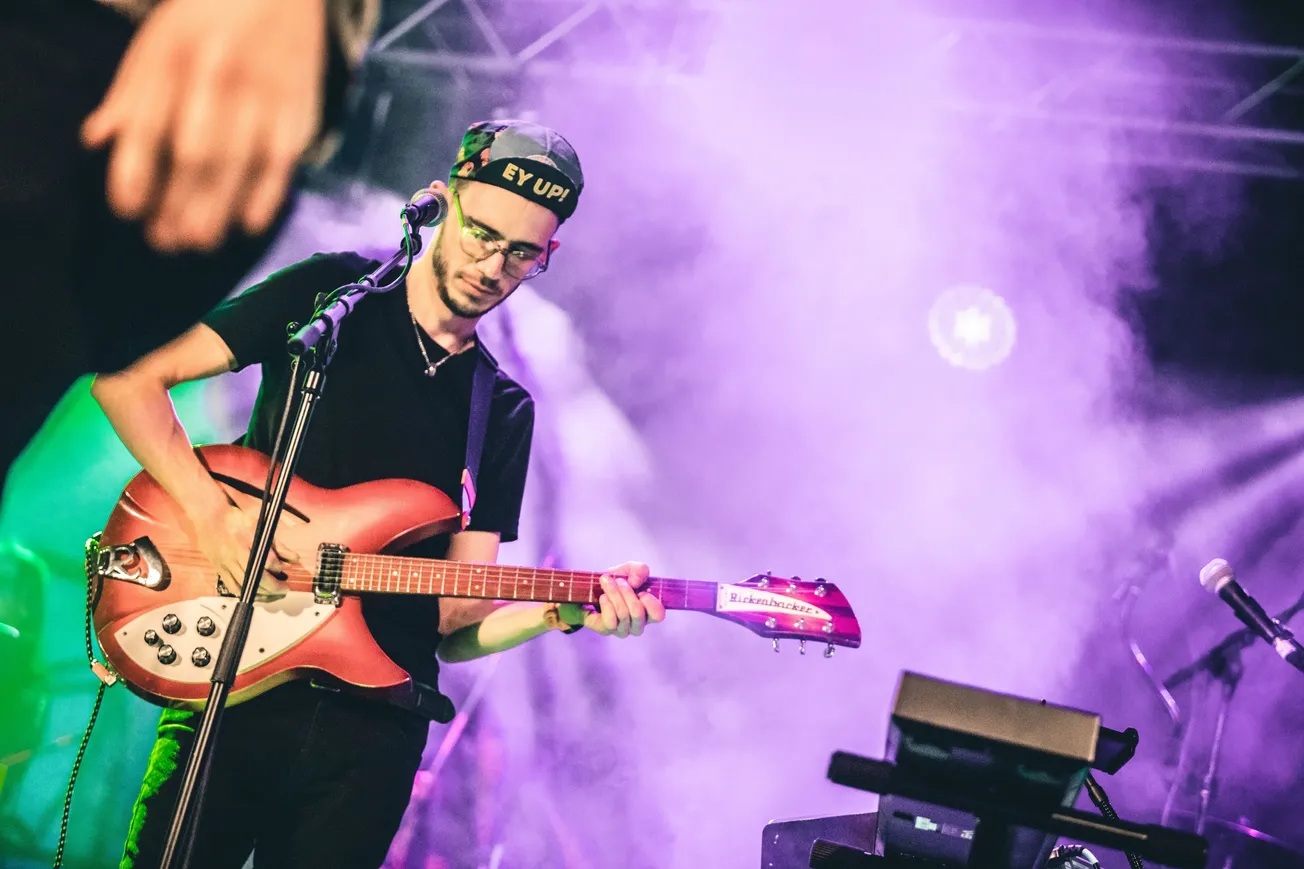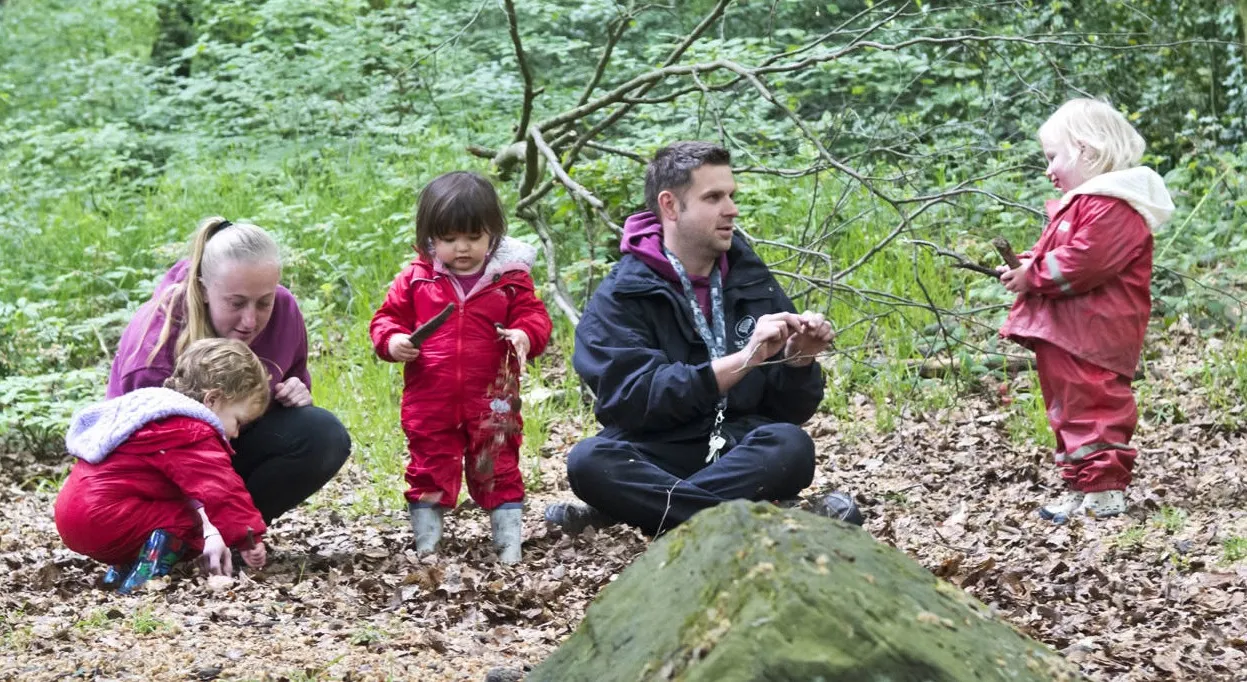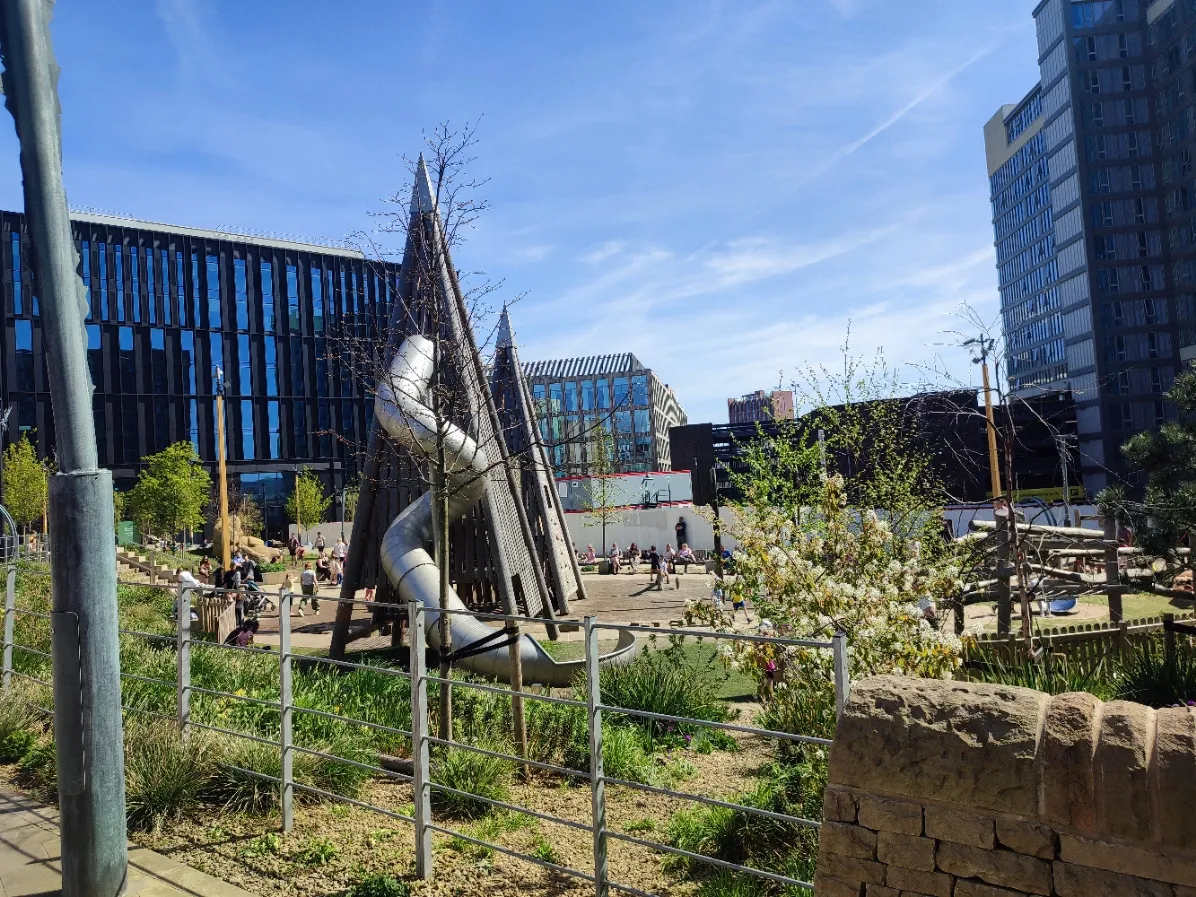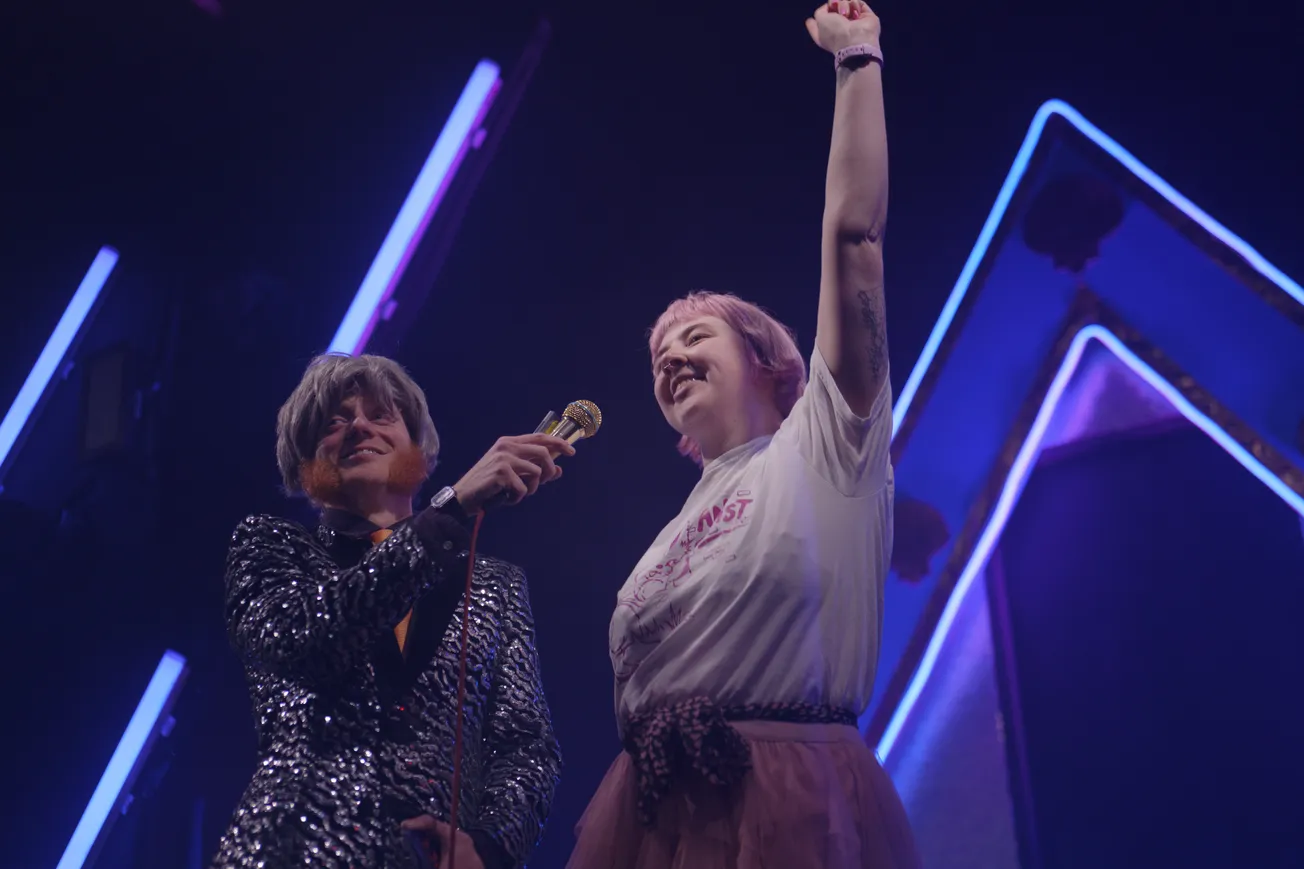In a madcap 33-month period between March 1963 and December 1965, The Beatles played in Sheffield seven times. Their second gig is probably the most famous. Star journalist Francis Mullions described it as “the night when Sheffield went Beatle-barmy” and thousands of “frenzied screamagers” yelled themselves hoarse. The venue they played, the Azena Ballroom in Gleadless Town End, is now the White Lane Co-op.
After that performance the band played in the city five more times, four at Sheffield City Hall and once more at the Gaumont Theatre on 8 December, 1965. It turned out to be one of the last gigs they ever played in the UK.
But in 2016, a group of local musicians, drawn together by a love for the Fab Four, decided to bring the music back — The Sheffield Beatles Project. It can’t be stressed enough how different they are to your common or garden tribute band. They don’t have a John, Paul, George or Ringo. They also never wear mop-top wigs, Sgt. Pepper’s outfits, or use dodgy Liverpudlian accents. Instead, they have four singers, two men and two women, who share lead vocals between them and take on backing vocals and harmonies when they’re not singing the lead.
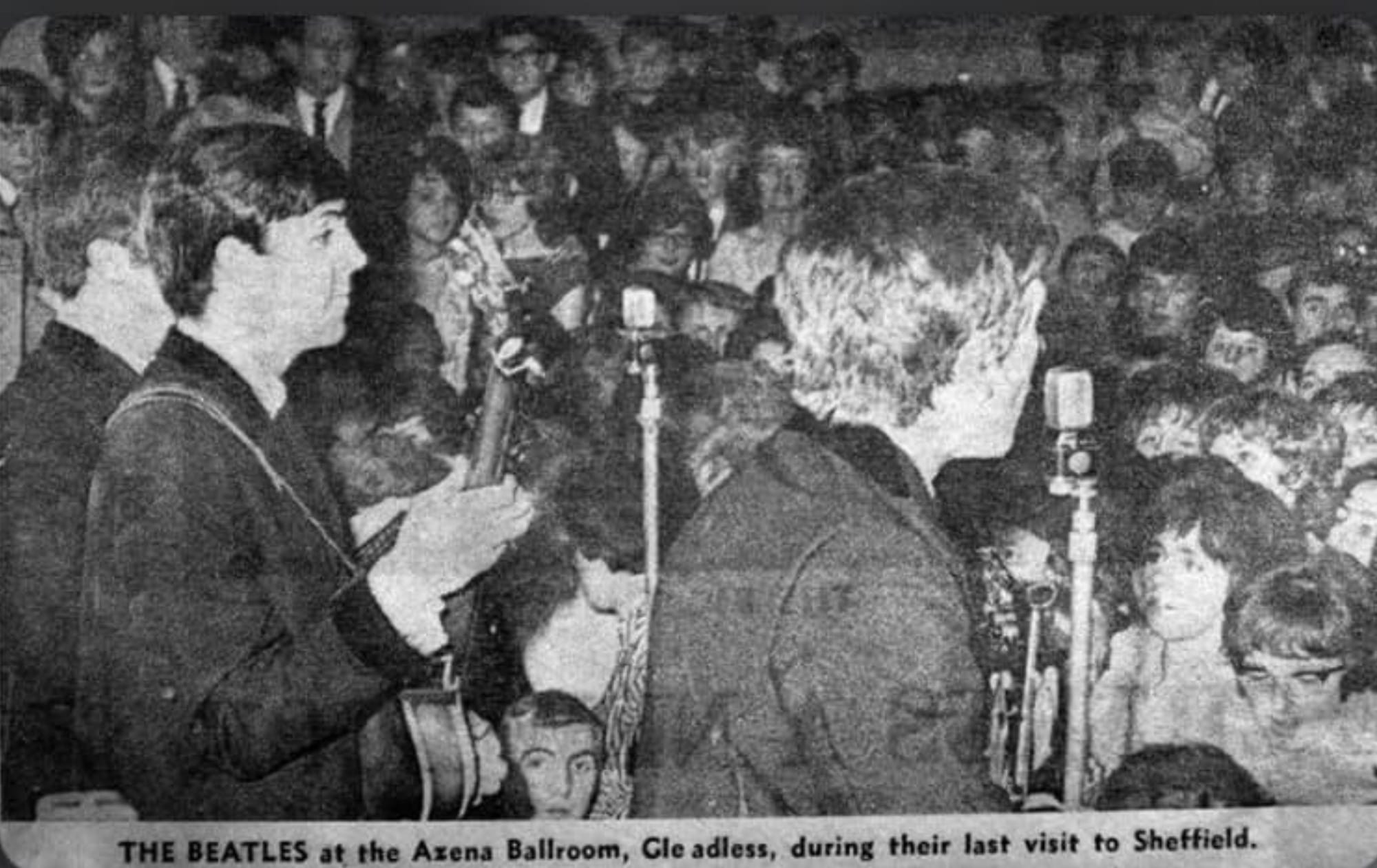
And they’re trying to do something much more ambitious than simply playing the hits. Every year, they take on one of the band’s albums — A-side and B-side — and play it, live, in its entirety. Many of the tracks were never even played live by The Beatles, but confined to the recording studio.
The idea is that by recreating the music as faithfully as possible they can capture the energy and creativity of the band at the height of their powers. They achieve this, in part, by using a 21-piece orchestra, who are conducted by musical director Ben Eckersley, who also plays piano. Their guitarists change their instruments countless times during the gig in search of just the right sound, while singer Ad Follett spends hours scouring the internet for samples he can use to replicate some of the band’s more out there tracks. When the band played Sgt Pepper’s Lonely Hearts Club Band in 2023, they even wheeled out a harp specifically for She’s Leaving Home. The overall effect is very different, and in my opinion so much better, than what one band member calls the “cosplay” of a typical tribute band.
I’m a huge Beatles fan and I live in Sheffield, so as you might expect I’ve seen them quite a few times. Four to be exact. Three during their now legendary Christmas shows and once during a Biblical downpour on Devonshire Green at the Tramlines Fringe in 2023. I was first introduced to them by a friend when they played Abbey Road in 2019, and fell in love immediately. That night ended with me trying to convince one of the band’s members in the pub that Mean Mr. Mustard and Polythene Pam were underrated highlights of the album’s B-side.
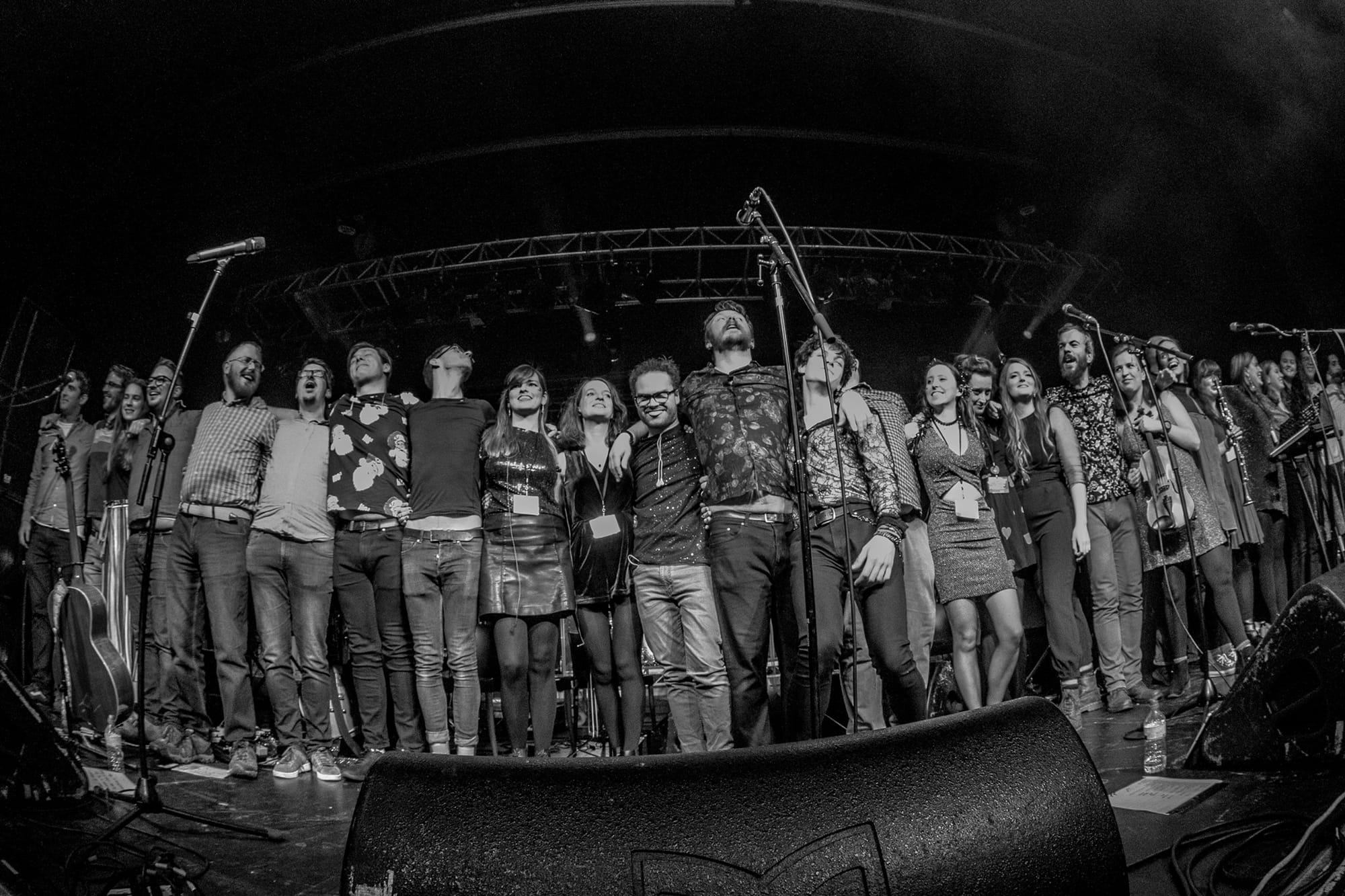
I’d like to think that I took this assignment on for purely journalistic reasons, to preview their upcoming gig at Sheffield Student’s Union. More deeply, I might suggest that I’m interested in what keeps people coming back to the music of The Beatles more than half a century on from their heyday, or how the Sheffield Beatles Project go about recreating such diverse music in a live environment. All of that is true, but if I’m honest I also have an ulterior motive: for one day only I really want to have them all to myself.
In a spacious room at Yellow Arch Studios in Neepsend, it’s the final rehearsal with the nine members of the core band: four singers, two guitarists, a bassist, a drummer, and a keys player. On Sunday, 21 more people will be added to the mix when the full orchestra arrives. In breaks between songs some of the band grumble about the acoustics not being great, but it looks the part. Ornate gold mirrors adorn the walls while two huge Persian rugs cover the floor. It feels like a room that The Beatles could once have used themselves.
This year they will be performing the most idiosyncratic of all the Beatles records, The White Album. Written after the band had attended a transcendental meditation retreat in Rishikesh, India, the album sees the band in their most creative and experimental period, taking in folk, blues, country, psychedelia, ska and even avant-garde sound collages. As a result of this dizzying variety, The White Album can feel disjointed and inconsistent to some, while others revel in its esoteric surprises. On its release in 1968, legendary Rolling Stone music critic Lester Bangs wrote it was “the first album by The Beatles, or in the history of rock, by four solo artists in one band.” It’s not clear whether he meant this positively or negatively.
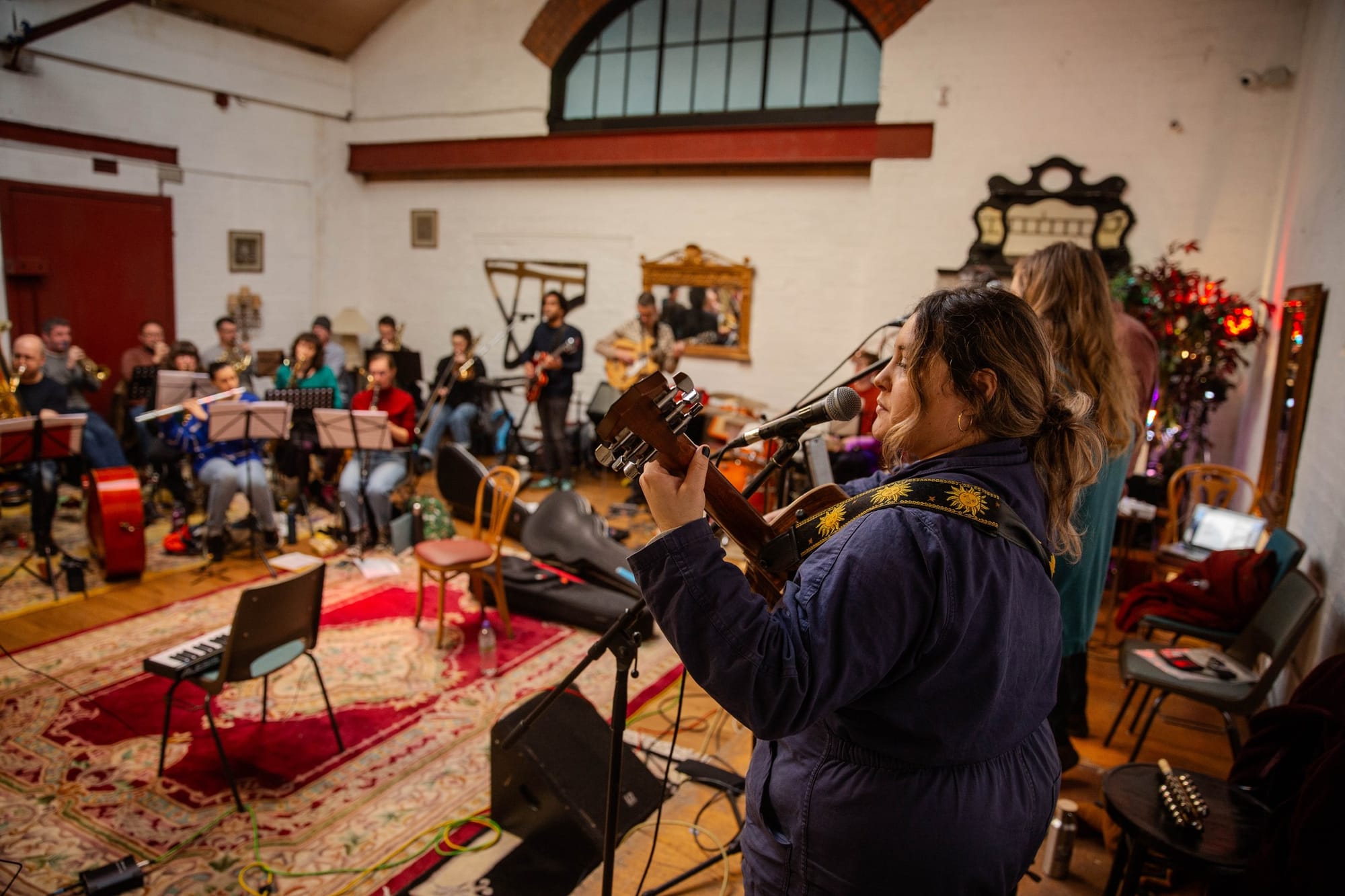
As I arrive the band are in the middle of practising a tricky segue of songs from Wild Honey Pie to The Continuing Story of Bungalow Bill and then While My Guitar Gently Weeps. It’s particularly challenging for guitarist Howard Price and bassist Phil Clegg, who have to do rapid guitar swaps, and musical director Ben Eckersley, who has to quickly load up another sound on his keyboard to get the unmistakable tinkly piano at the beginning of While My Guitar Gently Weeps. It takes them a few tries to get the sequence just right, but worth it. With his guitar held high on his body, the way guitarist Nick Cox absolutely crushes the song’s iconic solo makes me wish I was in the band rather than just writing about them.
After that three-song segue is perfected we’re on to Happiness Is a Warm Gun, which has a devilishly difficult set of rhythmic changes that even The Beatles struggled to perfect. Drummer Pete Hodge, who is new to the band this year, has been doing his research. “The Beatles tried 70 takes on the record and never got it right so stuck with 53 and 65 and edited them together,” he announces to the other members. As well as being an indication of how seriously they take their task, Hodge’s comment illustrates the central challenge of the Sheffield Beatles Project: that they are trying to perform an album by a band who had stopped playing live years beforehand. Being a studio-based band gave The Beatles free rein to try anything and everything they wanted to. And they did. To ask 30 or so mainly part-time Sheffield-based musicians to replicate that live is no small task.
In a break between songs, Eckersley tells me how the project came about. The first album they performed was Revolver for its 50th anniversary in 2016. At the time Eckersley and Cox shared a house together in Nether Edge. The idea was that, because no one had ever heard The Beatles play Revolver live, they would do it instead. Getting a few fellow musician friends together, they approached Tramlines who booked them for the O2 Academy. Caught by the bug, in 2017 they played Sgt. Pepper's Lonely Hearts Club Band and Magical Mystery Tour at the Folk Forest festival in Endcliffe Park.
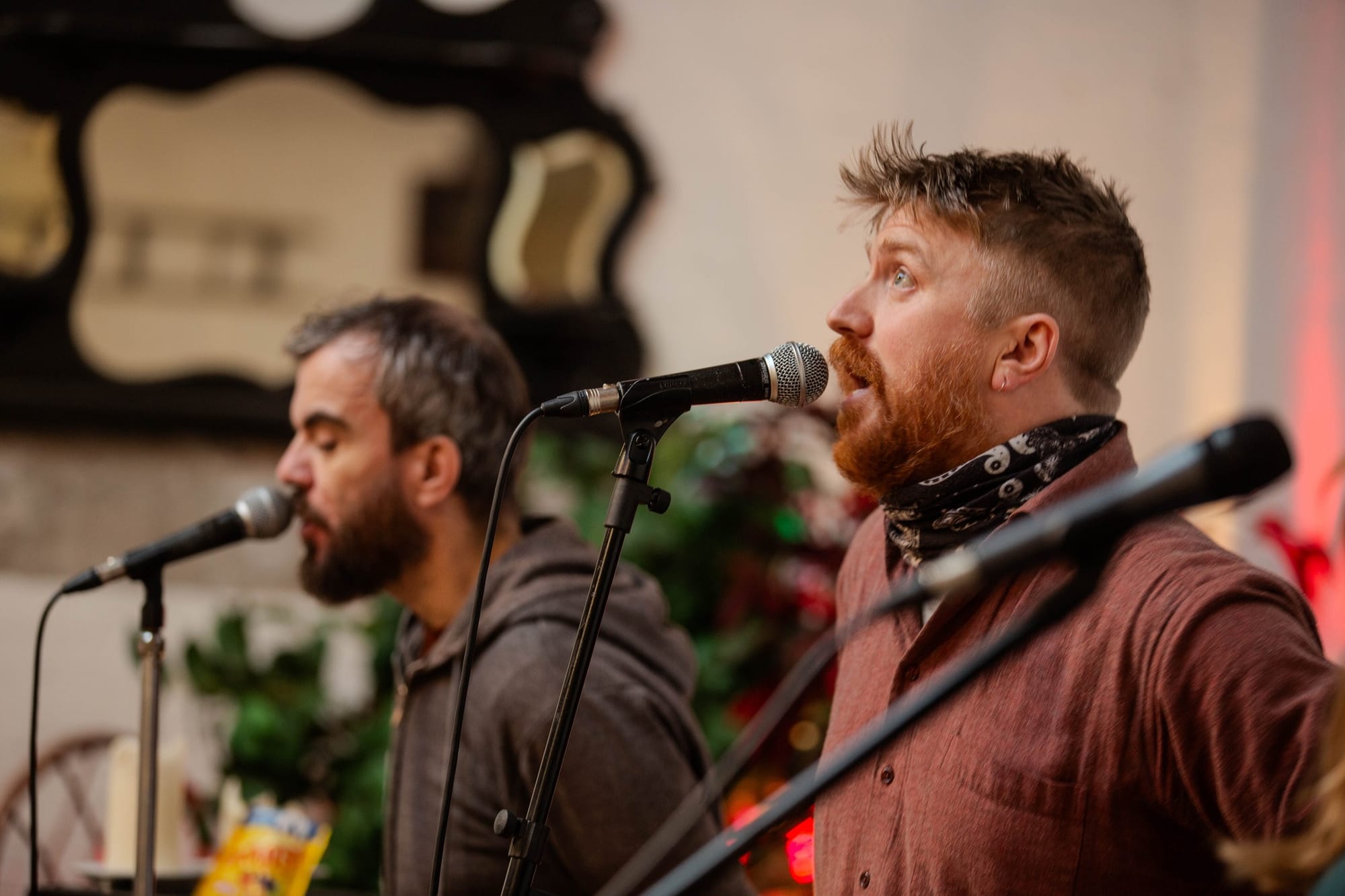
“That first year we didn't know if anyone would turn up but a couple of hundred people came down,” Ben says. “At Folk Forest, thousands of people were there. It’s still probably the biggest audience we have had.” They performed the same albums at the O2 Academy that December, and have played a different album every Christmas since, going through chronologically (excluding the Covid hit year of 2020).
Back in the rehearsal room, we’re rattling through the album at an incredible pace. The music hall-inspired Martha My Dear is followed in quick succession by the baroque Piggies, followed by the country-influenced Rocky Racoon. Up next is the screamed vocals, crunchy riffs and crash cymbals of Helter Skelter, which some claim single-handedly invented heavy metal. As I sit there being assaulted by a wall of sound I feel slightly sorry for singer Ad Follett who is destroying his vocal chords for my listening pleasure, but the effect is thrilling.
Still, what goes up must come down. The groans that precede Don’t Pass Me By are a reminder that even The Beatles had some duffers. “But it’s the worst song on the album,” moans singer Jack Weston as he reluctantly gets ready to play it. Thankfully, it’s the only song Ringo wrote on the album.
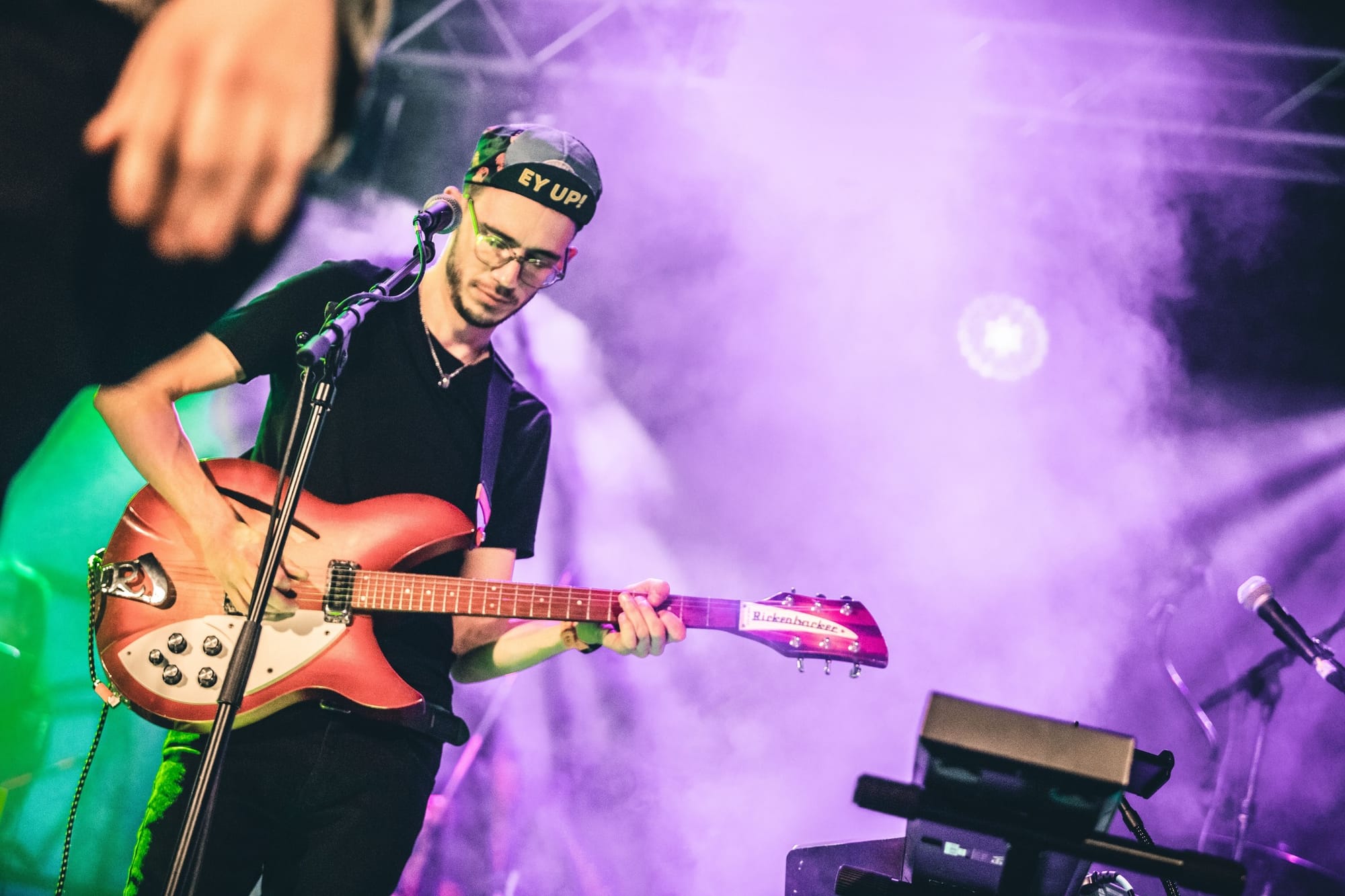
“The core philosophy of the band is that we play the full album, we don't just do the hits,” explains Ben. “There are superfans who will go and see any number of Beatles tribute acts and all hear the same songs. We're here for people who want to hear Piggies or Savoy Truffle. No one else plays those songs.” This “warts and all” approach to the music means they also play the songs that are less well known for a good reason, like the aforementioned Don’t Pass Me By. “For someone out there that might be their favourite Beatles song,” says Ben. “Yeah, Ringo,” shoots back Nick.
This pedantry for accuracy extends all the way to The Beatles' more experimental music, some of which appears on The White Album. For the soundscape collage of Revolution 9, Ben has written some loops for the orchestra which he says are “kind of the same notes” even if the exact sounds aren’t the same. (Perhaps wisely, they have opted to perform a slimmed-down four-minute version, rather than the eight minutes of the one on the record).
All the band have either musical careers or day jobs away from the Sheffield Beatles Project. In the early days they wouldn’t get paid very much (just £50 each in 2017), but they now make enough money from the gigs to compensate them for the time they have spent prepping, learning, transposing and rehearsing the music. “People that I know who go see it as a bit of a Sheffield Christmas tradition now,” Nick says. “They love it and we love it.”
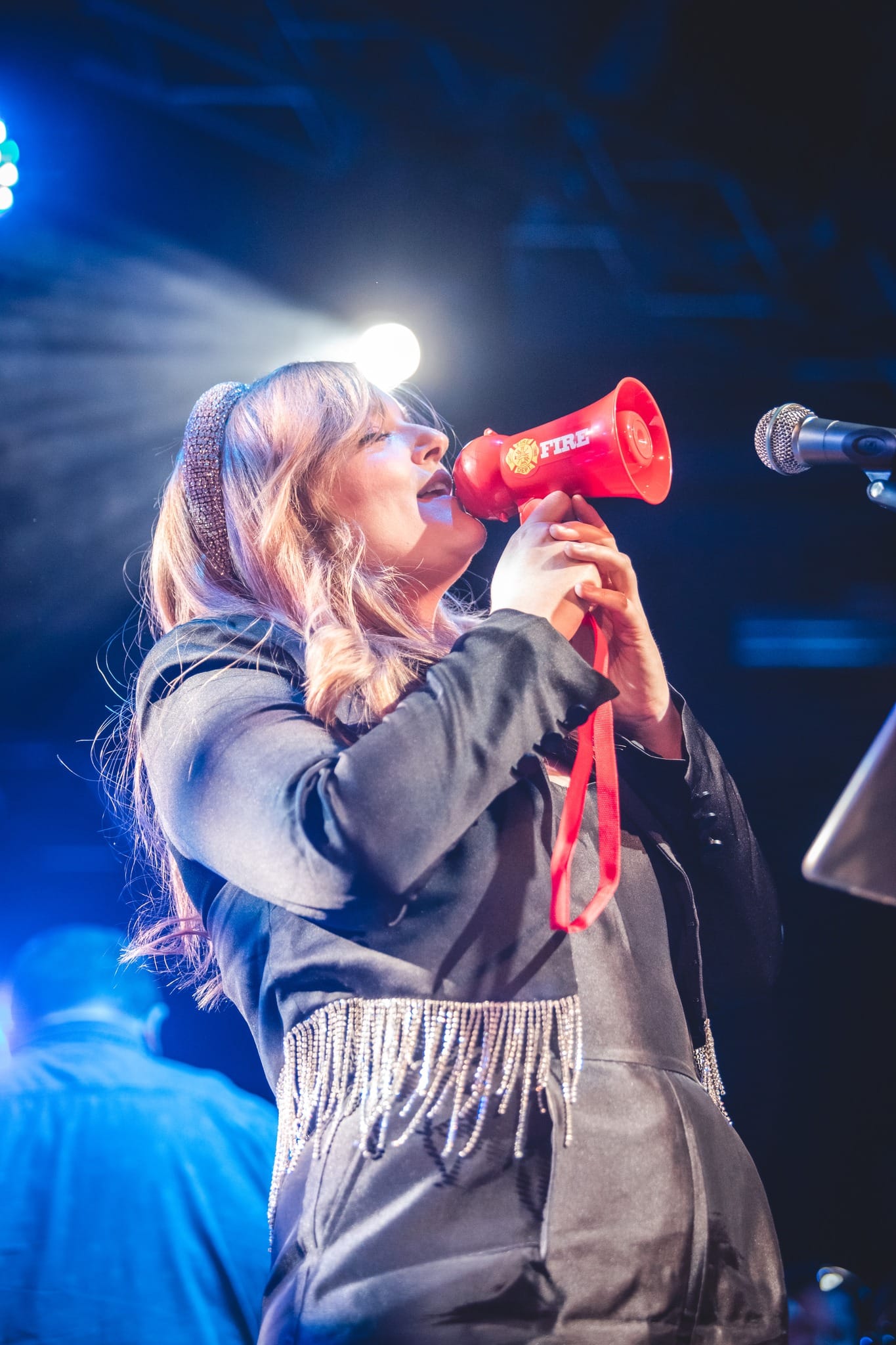
Returning this year after one year away is Laura James. She didn't take part last year because she was on a ship in the Antarctic Ocean, where she was performing for guests on a cruise. Tonight she will perform Long, Long, Long, I’m So Tired and Good Night. She says she loves them all but Good Night is the one she enjoys singing the most. “I’d never get the chance to do something like that with a full orchestra any other time,” she says. “I just feel so lucky to be a part of it.”
Nick tells me that when they last performed The White Album, in 2018, he was “dreading it” due to its sprawling length and wild changes in mood. But this time, with six more years under their belt, feels different. “It’s so eclectic,” he says. “There are as many hits as there are on Sgt. Pepper’s, but it’s just three times as long.” “The album is full of these big record scratches and all of a sudden you're in a completely different genre,” Guitarist Howard Price says. “What we’re trying to do is reproduce that live.”
When I arrived earlier, some of the Saturday afternoon drinkers at Yellow Arch were dancing outside the band’s rehearsal room as they performed the ska-tinged Ob La Di, Ob La Da. Do you know who they are, I ask the slightly drunken man dancing with his girlfriend. “Yeah, it’s The Beatles isn’t it?” he says. Not quite, but it’s as close as we’re going to get.

Comments
How to comment:
If you are already a member,
click here to sign in
and leave a comment.
If you aren't a member,
sign up here
to be able to leave a comment.
To add your photo, click here to create a profile on Gravatar.


